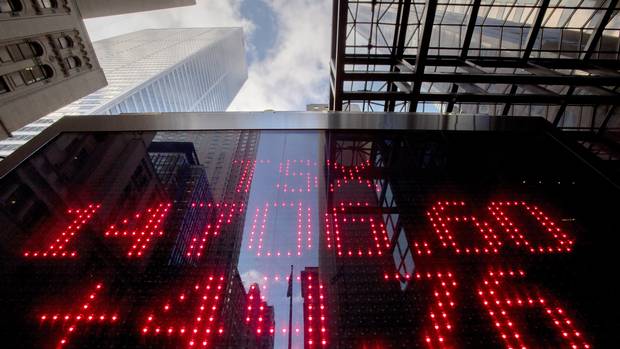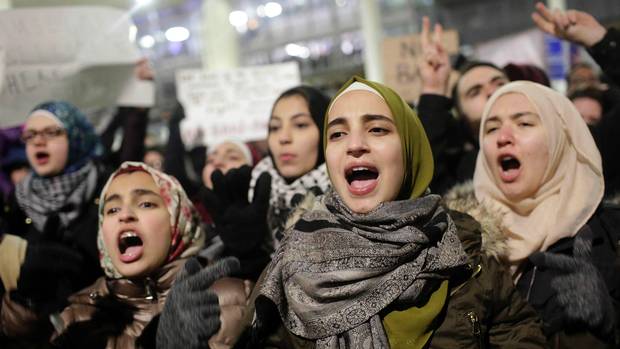The Trump presidency has exposed and created deep divisions between Canada and the U.S., on issues from protectionism and the economy to pluralism and immigration. Here are some highlights from The Globe's coverage of an eventful year. (And Americans: If the past year has made you consider moving north, we have some pointers on why that might be more complicated than you think)
'America First' versus Canada Too

Prime Minister Justin Trudeau embraces Foreign Affairs Minister Chrystia Freeland after she delivered a speech on Canada’s foreign policy in the House of Commons on June 6, 2017.
CHRIS WATTIE/REUTERS
In the first year of Donald Trump's presidency, his "America First" policies upended allies' expectations of U.S. global leadership, on issues ranging from climate change (Mr. Trump threatened to withdraw the U.S. from the Paris accord) to trade (Mr. Trump pushed to aggressively renegotiate NAFTA) to NATO (Mr. Trump made warm overtures to Russia as it was in a standoff with the military alliance over Moscow's geopolitical ambitions in Europe).
After a few months getting used to the new administration, and as rifts widened between the United States and other Western countries, Prime Minister Justin Trudeau's government outlined a new foreign-policy plan in June to uphold the global liberal order with or without U.S. help. On June 6, Foreign Affairs Minister Chrystia Freeland said Canada would be a "client state" if it relied solely on U.S. protection, adding that, while a "Canada first" approach would be wrong, the country has to chart a more independent course:
Indeed, many of the voters in last year’s [U.S.] presidential election cast their ballots, animated in part by a desire to shrug off the burden of world leadership. To say this is not controversial: it is simply a fact.
The fact that our friend and ally has come to question the very worth of its mantle of global leadership, puts into sharper focus the need for the rest of us to set our own clear and sovereign course. For Canada that course must be the renewal, indeed the strengthening, of the postwar multilateral order.
More reading:
Who was in charge?
President Donald Trump is joined by the Congressional leadership and his family as he formally signs his cabinet nominations into law, in the President’s Room of the Senate, at the Capitol in Washington.
Pool/Reuters
After Mr. Trump's election, the Trudeau government got used to a U.S. leader dramatically unlike the one before him, and unlike the one that Ottawa's political class expected to win in 2016. The Prime Minister's cabinet, which underwent a major shuffle shortly before Mr. Trump's inauguration in January, was in close contact with their counterparts in Washington, and the two leaders met face to face at a highly publicized official visit in February. Here are some of the important match-ups:
Foreign affairs
- Canada: Chrystia Freeland, Foreign Affairs Minister
- U.S.: Rex Tillerson, Secretary of State
Diplomats
- Canada: David MacNaughton, Canadian ambassador in Washington
- U.S.: Kelly Craft, U.S. ambassador to Canada
Trade policy
- Canada: Ms. Freeland; François-Philippe Champagne, International Trade Minister
- U.S.: Robert Lighthizer, U.S. Trade Representative; Wilbur Ross, Commerce Secretary
Finance
- Canada: Bill Morneau, Finance Minister
- U.S.: Steven Mnuchin, Treasury Secretary
Environment
- Canada: Catherine McKenna, Environment and Climate Change Minister
- U.S.: Scott Pruitt, head of the Environmental Protection Agency
In addition to the cabinet-level officials, several advisers played important roles as go-betweens on the trade file and other issues:
- Canada: Brian Mulroney, former prime minister advising the Liberal government on trade policy; Rona Ambrose, former interim Conservative Party leader advising the government on the NAFTA talks
- U.S.: Jared Kushner, Mr. Trump’s son-in-law and adviser; Ivanka Trump, the President’s daughter
More reading:
Trade and the economy

Toronto’s financial district on Nov. 9, 2016, the day after the election.
FRANK GUNN/THE CANADIAN PRESS
Canada and the U.S. were as different as can be on trade in 2017. On one side, a liberal who championed global trade; on the other, a nativist conservative who, in his inauguration speech, pledged an "America first" attitude to not only trade, but immigration, foreign policy and taxes.
Canada, Mexico and the U.S. spent months negotiating an overhaul the North American free-trade agreement, which Mr. Trump alleged has been unfair to the United States. The Trump administration initially wanted those talks finished by the end of 2017, but after delays and deadlocks over the major sticking points – including auto manufacturing, Canada's dairy sector and NAFTA's dispute-resolution mechanisms – the talks threatened to drag on well into 2018. Meanwhile, punitive U.S. duties on Canadian softwood lumber escalated a tit-for-tat trade conflict between the two countries. Ottawa ultimately took its grievances to the World Trade Organization, alleging in a broad complaint that Washington was bending the rules of global commerce to its own self-interest.
More reading on trade:
Environment and energy

GETTY IMAGES/RON CHAPPLE STUDIOS
Mr. Trump – who once called climate change a Chinese hoax, in a tweet he later said was a joke – completely reversed the Obama administration's promises to curb greenhouse-gas emissions, terminating Mr. Obama's Clean Power Plan for coal-fired power plants. Most dramatically, Mr. Trump vowed to pull the United States out of the 195-country Paris climate-change agreement, saying it was a "bad deal for America."
While Canada's government – which is pressing ahead with a contentious national carbon-pricing plan – criticized Mr. Trump's environmental policies, Mr. Trudeau also supported Mr. Trump's decision to give TransCanada Corp. the needed permits to build its Keystone XL pipeline from Alberta, which the Obama administration blocked. Energy policy was also a challenging part of the NAFTA renegotiations, with high stakes for oil-producing provinces and the Canadian economy.
More reading:
Military and foreign policy

A Canadian Armed Forces member looks on as a Polish soldier fires a C9 machine gun at a training area in Poland March 15, 2016.
MASTER CORPORAL ANDREW DAVIS
Ottawa and Washington have been partners in some of the world's most important military alliances, from NATO abroad to NORAD at home. Mr. Trump's view of the North Atlantic Treaty Organization evolved a lot after he took office. In mid-January, he said the 28-nation alliance was obsolete. But then he began professing support for the military alliance, and chided member countries that he felt weren't paying their fair share.
NATO requires countries to spend 2 per cent of their GDP on defence; Canada pays less than half of that, and less than almost any NATO member. In June, Defence Minister Harjit Sajjan outlined a $62-billion military-spending package that would raise that to 1.4 per cent of economic output by 2024-25, but most of the new spending begins after the next federal election.
In the meantime, the differing Canadian and American approaches to Russia will be closely watched. During and after the election, Mr. Trump – whose campaign team and staff are facing multiple investigations by the FBI, Justice Department and Congress for their connections to Moscow – gestured toward rapprochement with Russia, which has been at odds with NATO since Moscow's 2014 annexation of Crimea from Ukraine. Mr. Trudeau has said Canada – which is training Ukrainian troops to counter Russian aggression and is sending troops to Latvia to help NATO's mission there – will continue to support the alliance.
More reading:
Refugees, race and immigration

Demonstrators protest agaist Mr. Trump’s executive immigration ban at Chicago O’Hare International Airport on Jan. 28, 2017.
JOSHUA LOTT/AFP/GETTY IMAGES
Mr. Trump ran for office promising far-reaching measures to close off America's borders, such as building a wall along the Mexican border and barring Muslims from entering the country. In his first weeks in office, Mr. Trump acted on those promises with alarming speed, sowing worldwide confusion over whether and how foreigners and dual citizens, including Canadians, could visit the country. Mr. Trump also attracted support from white nationalist groups like the ones behind the deadly violence in Charlottesville, Va.
Mr. Trump tried three times to bar citizens from a list of predominantly Muslim countries from applying for visas. ( The most recent version included a few non-Muslim countries, like North Korea and Venezuela; those bans weren't affected by the Hawaii judge's ruling that struck down the latest travel ban.) Each time, U.S. district courts blocked those policies, and while the Supreme Court allowed the final ban to go into effect, it hasn't issued a final decision on the matter. Mr. Trump's orders allowed Canadians with dual citizenship from the banned countries to travel as usual, but several Canadians have reported problems crossing the border. The prospect of a U.S. immigration crackdown also prompted hundreds of asylum seekers to cross the Canada-U.S. border in the wilderness to make claims here instead.
More reading:
Gender equality

Demonstrators protest on the National Mall in Washington, DC, for the Women’s march on January 21, 2017.
ANDREW CABALLERO-REYNOLDS
Mr. Trudeau – a self-professed feminist whose gender-balanced 2015 cabinet made headlines around the world – made an unusual ally with Mr. Trump, who was under fire in the 2016 election for calling Ms. Clinton a "nasty woman" and faced allegations of sexual assault from more than a dozen women. The day after his inauguration, hundreds of thousands of people rallied in the U.S. capital for the Women's March on Washington, with sister demonstrations in Canadian cities and around the world.
The leaders' feminist credentials came into sharp contrast on foreign aid and reproductive health. The Trump administration, barring any foreign-aid spending on projects mentioning abortion, effectively cut $600-million (U.S.) from family-planning programs in the developing world, leaving other countries scrambling to make up the difference. In the summer, Ottawa unveiled what it branded "Canada's first feminist international-assistance policy," and then committed $241.5-million to reproductive health and contraception programs.
More reading:
The opposition parties

Andrew Scheer speaks after winning the leadership at the Conservative Party convention in Toronto on May 27, 2017.
MARK BLINCH/REUTERS
The 2016 U.S. election, which happened in the midst of the Conservative Party's leadership contest, led to fears of politicians bringing Trumpism Lite to Canada. Those fears dissipated somewhat when, in May, the party selected Andrew Scheer as leader. Mr. Scheer, a social conservative compromise candidate seen as a more genial version of Stephen Harper, narrowly beat Maxime Bernier, a libertarian who supported Mr. Trump's criticisms of Canadian dairy supply management. The New Democrats, meanwhile, chose Jagmeet Singh as their new leader in October.
Both opposition parties closely watched the Trudeau government's handling of the NAFTA file and Canada-U.S. relations generally. Sometimes that erupted into unusual partisan conflicts, such as the Liberals accusing Tory MPs of jeopardizing the NAFTA talks with a U.S. media blitz against the $10.5-million settlement with Omar Khadr, a former Guantanamo Bay inmate. (The Conservatives rejected that assertion, then said Mr. Trudeau was himself jeopardizing the talks by being portrayed in Rolling Stone magazine as a progressive foil to Mr. Trump.)
More reading:
So you're American and you want to move to Canada

A woman takes a photograph at a citizenship ceremony in Vancouver on July 1, 2009.
DARRYL DYCK/THE CANADIAN PRESS
The night of Mr. Trump's election win saw a huge spike in interest in Americans moving north, and Immigration, Refugees and Citizenship Canada's website suffered outages due to heavy traffic.
Not so fast, Americans: Immigration lawyers say the path to Canadian citizenship isn't an easy one, and unless Americans move here for a job with exemptions under NAFTA (the trade deal Mr. Trump wants to renegotiate), employers will need to prove the need to hire an American before securing a work visa. Here's a primer from Michelle Zilio on the issues involved in American citizens coming to Canada.
More reading:
With reports from Reuters, Associated Press and Globe staff
MORE FROM THE GLOBE AND MAIL
Flashback: Donald Trump’s inauguration speech in under four minutes





















